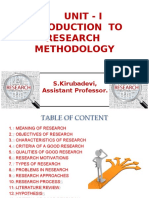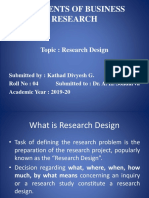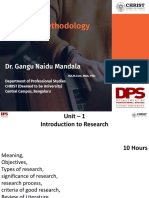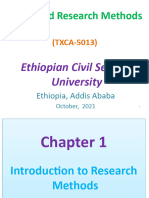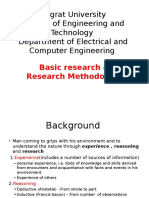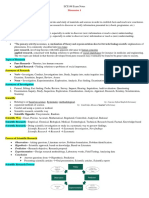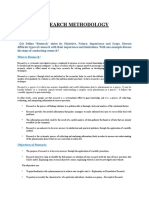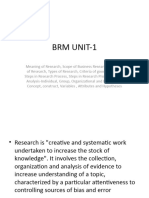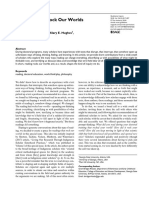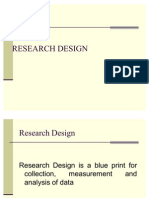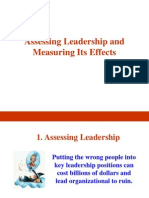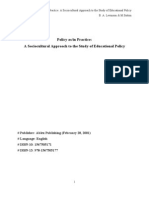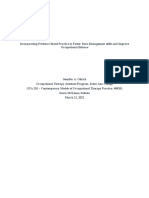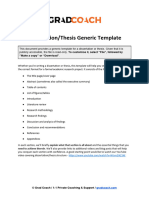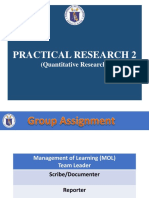0 ratings0% found this document useful (0 votes)
9 viewsResearch Design 1
Research Design 1
Uploaded by
daspriyanshu351Copyright:
© All Rights Reserved
Available Formats
Download as PPT, PDF, TXT or read online from Scribd
Research Design 1
Research Design 1
Uploaded by
daspriyanshu3510 ratings0% found this document useful (0 votes)
9 views16 pagesCopyright
© © All Rights Reserved
Available Formats
PPT, PDF, TXT or read online from Scribd
Share this document
Did you find this document useful?
Is this content inappropriate?
Copyright:
© All Rights Reserved
Available Formats
Download as PPT, PDF, TXT or read online from Scribd
Download as ppt, pdf, or txt
0 ratings0% found this document useful (0 votes)
9 views16 pagesResearch Design 1
Research Design 1
Uploaded by
daspriyanshu351Copyright:
© All Rights Reserved
Available Formats
Download as PPT, PDF, TXT or read online from Scribd
Download as ppt, pdf, or txt
You are on page 1of 16
RESEARCH DESIGN
• Logic of the inquiry
• Purpose of the inquiry
• Types of research design
• Research (Study) design vs. research methodology
• Directions of reasoning (logic
Some basic concepts
•Research methodology
–Quantitative vs. Qualitative vs. Participatory/action research
•Research methods
–Methods of sampling, data collection and data analysis
•Research design
–Experimental, descriptive, exploratory
RESEARCH DESIGN
• RESEARCH DESIGN refers to the plan,
structure, and strategy of research--the
blueprint that will guide the research
process.
LOGIC OF THE INQUIRY
• Research design is the overall plan for
connecting the conceptual research
problems to the pertinent (and achievable)
empirical research.
•In other words, the research design
articulates what data is required, what
methods are going to be used to collect and
analyse this data, and how all of this is
going to answer your research question.
• Different design logics are used for different
types of study.
RESEARCH DESIGN VS RESEARCH METHODOLOGY
Research design • Research methodology
Focuses on the research
Focuses on the end-product: process and the kind of tools
What kind of study is being and procedures to be used.
planned and what kind of results • E.g. Document analysis, survey
are aimed at. methods, analysis of existing
• E.g. Historical - comparative (secondary) data/statistics etc)
study, interpretive approach OR • Point of departure (driven by) =
exploratory study, inductive and Specific tasks (data collection
deductive etc. or sampling) at hand.
• Point of departure (driven by) = • Focuses on the individual (not
Research problem or question. linear) steps in the research
process and the most
• Focuses on the logic of research: ‘objective’ (unbiased)
What evidence is required to procedures to be employed.
address the question
adequately?
TYPES OF RESEARCH
• Descriptive vs. Analytical: Descriptive research
includes surveys and fact-finding enquiries of different
kinds. The major purpose of descriptive research is
description of the state of affairs as it exists at present. In
social science and business research we quite often use
the term Ex post facto research for descriptive research
studies. The main characteristic of this method is that the
researcher has no control over the variables; he can only
report what has happened or what is happening.
Analytical research
• In analytical research, the researcher has
to use facts or information already
available, and analyze these to make a
critical evaluation of the material.
Applied vs. Fundamental: Research can either be
applied (or action) research
• Research can either be applied (or action)
research or fundamental (to basic or pure)
research.
• Applied research aims at finding a solution for an
immediate problem facing a society or an
industrial/business organisation, whereas
fundamental research is mainly concerned with
generalisations and with the formulation of a
theory.
• “Gathering knowledge for knowledge’s sake is
termed ‘pure’ or ‘basic’ research
Quantitative vs. Qualitative:
• Quantitative research is based on the measurement of
quantity or amount. It is applicable to phenomena that
can be expressed in terms of quantity.
• Qualitative research, on the other hand, is concerned
with qualitative phenomenon, i.e., phenomena
relating to or involving quality or kind. For instance, when
we are interested in investigating the reasons for human
behaviour (i.e., why people think or do certain things),
• We quite often talk of ‘Motivation Research’, an
important type of qualitative research.
• Qualitative research is specially important in the
behavioural sciences where the aim is to discover the
underlying motives of human behaviour.
QUALITATIVE VS. QUANTITATIVE
METHODS
QUANTITATIVE QUALITATIVE
Hypothesis testing • Discovery and understanding of
Variables events
Measuring instruments • Themes, motives, categories
developed before the • Measuring instruments develop
actual project starts during the project, considering
Numeric data, precise, setting and researcher
exact measurement • Textual data, documents,
Standardized procedures, observations, descriptive
repetitions • Individualized procedures,
Analysis: statistical repetitions are difficult and different
methods, charts and • Analysis: seeking patterns,
tables generalizations from available data
Results: charts, tables, • Results: stories, narratives,
facts descriptions
Qualitative Methods
Researcher collects data in a real environment.
Researcher himself/herself is the key research tool.
Focus of research is a process or activity itself, not
just results of that process or activity.
Data collected is most often verbal (non-numerical).
Verbal data analysis (rarely numerical).
Results are facts with limited usability and new
research questions. Rarely verification of hypothesized
relationships are confirmed.
Types of Research
• Exploratory Research: The objective of exploratory research is
to gather preliminary information that will help define problems and
suggest hypotheses. Exploratory research helps in determine the
best research design, data collection method and selection of
subjects. Exploratory research relies on secondary research such
as reviewing literature, data, informal discussion with consumer,
employees
• Descriptive Research (Statistical Research): describes data
and characteristics about the population, attitude of consumer etc.
• Casual Research: is to test hypothesis about cause-and-
effect relationships. The marketer tries to determine if the
manipulation of one variable, called the independent variable,
affects another variable, called dependent variable.
DIRECTIONS OF REASONING
Criteria of Good Research
1.The purpose of the research should be clearly
defined and common concepts be used.
2. The research procedure used should be described
in sufficient detail to permit another researcher to
repeat the research for further advancement,
keeping the continuity of what
has already been attained.
3. The procedural design of the research should be
carefully planned to yield results that areas
objective as possible.
4. The researcher should report with complete
frankness, flaws in procedural design and
estimate their effects upon the findings .
Criteria of Good Research
5. The analysis of data should be sufficiently adequate to
reveal its significance and the methods of analysis
used should be appropriate. The validity and reliability of
the data should be checked carefully.
6. Conclusions should be confined to those justified by the
data of the research and limited to those for which the
data provide an adequate basis.
7. Greater confidence in research is warranted if the
researcher is experienced, has a good reputation in
research and is a person of integrity.
Qualities of a good research
1. Good research is systematic:
2. Good research is logical:
3. Good research is empirical:
4. Good research is replicable
You might also like
- EGH479 Advances in Civil Engineering PracticeDocument13 pagesEGH479 Advances in Civil Engineering PracticeMuhammad FauzanNo ratings yet
- Introduction To Research MethodologyDocument41 pagesIntroduction To Research Methodologyskirubaarun100% (4)
- Architectural ResearchDocument42 pagesArchitectural ResearchSirat KrNo ratings yet
- Research StrategyDocument2 pagesResearch StrategyIhsan Ullah100% (1)
- 17 Tips To Improve Your Nursing DocumentationDocument26 pages17 Tips To Improve Your Nursing DocumentationAgustin Lutfiana100% (2)
- Unit 1Document14 pagesUnit 1Arjun MNo ratings yet
- Reserach Methodology LectureDocument29 pagesReserach Methodology LectureKai KokoroNo ratings yet
- Research Methodology: Prof. Deepak Nagaria BIET, JhansiDocument45 pagesResearch Methodology: Prof. Deepak Nagaria BIET, JhansiHitendra SinghNo ratings yet
- CH 1 RMDocument30 pagesCH 1 RMTMIMITWJ2030No ratings yet
- Research MethodologyDocument203 pagesResearch Methodologyrohit vermaNo ratings yet
- BRM Unit 1-MergedDocument412 pagesBRM Unit 1-MergedAlexis ParrisNo ratings yet
- Paper-1 Research MethodologyDocument17 pagesPaper-1 Research Methodologyoskruthika94No ratings yet
- Notes-Introduction To Research MethodologyDocument165 pagesNotes-Introduction To Research Methodologymacklinaprotas01No ratings yet
- Research MethodologyDocument42 pagesResearch MethodologyDruthi GsNo ratings yet
- Lecture 1Document38 pagesLecture 1Inayat QuarisheNo ratings yet
- Basic Element of Research DesignDocument30 pagesBasic Element of Research DesignBola-Ogunyemi Teniola BrightNo ratings yet
- Research DesignDocument56 pagesResearch DesignDhan ShahiNo ratings yet
- RM StudentDocument36 pagesRM StudentNitesh maliNo ratings yet
- Research Methodology Unit-1Document27 pagesResearch Methodology Unit-1Sushma ReddyNo ratings yet
- Wk07 - 1 - Research MethodologyDocument21 pagesWk07 - 1 - Research MethodologyDahlia GamalNo ratings yet
- Elements of Business ResearchDocument16 pagesElements of Business ResearchDivyesh KathadNo ratings yet
- RM Unit 1-MergedDocument364 pagesRM Unit 1-MergedAnirudh Kar 1912705No ratings yet
- Chapter One Introduction To Research MethodologyDocument27 pagesChapter One Introduction To Research MethodologyBaruk Umeta DegoNo ratings yet
- Research Methodology 1Document22 pagesResearch Methodology 1Jyoti Tripathi100% (1)
- Ec 647 Ee 9Document19 pagesEc 647 Ee 9Hussain DUrraniNo ratings yet
- Research 5th SabaDocument140 pagesResearch 5th Sabattaass76898No ratings yet
- Research of GonderDocument68 pagesResearch of GonderTesfu HettoNo ratings yet
- Module 2 Part 1 Research DesignDocument30 pagesModule 2 Part 1 Research Designabhiramkraj1No ratings yet
- Assignment of SPSSDocument12 pagesAssignment of SPSSAkshay poplyNo ratings yet
- Topic 0. Definition of Research Design Characteristics of Research Design Types of Research DesignDocument16 pagesTopic 0. Definition of Research Design Characteristics of Research Design Types of Research DesignAyesha UsmanNo ratings yet
- Lecture 5. Research StrategiesDocument21 pagesLecture 5. Research StrategiesYasir AslamNo ratings yet
- UG Physiology Sem6 DSE4TDocument37 pagesUG Physiology Sem6 DSE4TBiksham JimmidiNo ratings yet
- Research Design PPT 6 IIBMDocument38 pagesResearch Design PPT 6 IIBMYogesh Girgirwar100% (10)
- Chapter 1-Introduction To Research Methology Ver 2Document71 pagesChapter 1-Introduction To Research Methology Ver 2jemalseid241No ratings yet
- The Five WsDocument81 pagesThe Five WsHamidullah AminNo ratings yet
- Types of ResearchDocument28 pagesTypes of Researchbinilucky224No ratings yet
- RM1 PDFDocument85 pagesRM1 PDFbkattriNo ratings yet
- Research Methodolgy SlidesDocument38 pagesResearch Methodolgy Slidesaziz.sediqi2017No ratings yet
- Research Process - Research DesignDocument14 pagesResearch Process - Research DesignOmnitrix OmnitrixNo ratings yet
- Introduction To Research: Res 1 - Thesis SeminarDocument41 pagesIntroduction To Research: Res 1 - Thesis SeminarGene Kings PeraltaNo ratings yet
- Scientific Research Methods: A.Salad (MS.C)Document65 pagesScientific Research Methods: A.Salad (MS.C)Abdulrahman OsmanNo ratings yet
- BRM-unit 2Document55 pagesBRM-unit 2mahima singhNo ratings yet
- Research MethodsDocument24 pagesResearch MethodsDagim AbaNo ratings yet
- Intro To Research MethodologyDocument18 pagesIntro To Research MethodologyMoud KhalfaniNo ratings yet
- Research MethodologyDocument38 pagesResearch MethodologyAbdullah KhalidNo ratings yet
- Opt 407Document57 pagesOpt 407teamtruth50No ratings yet
- 5 Methodology SectiionDocument31 pages5 Methodology Sectiionmarshallchamunorwa123No ratings yet
- Adigrat University College of Engineering and Technology Department of Electrical and Computer EngineeringDocument32 pagesAdigrat University College of Engineering and Technology Department of Electrical and Computer EngineeringBelayneh TadesseNo ratings yet
- Basic Concepts of Research MethodologyDocument41 pagesBasic Concepts of Research MethodologyAeida IndiaNo ratings yet
- Ece198 Exam1 NotesDocument7 pagesEce198 Exam1 NotesTRISHA ISOBELLE ARBOLEDANo ratings yet
- ResearchDocument94 pagesResearchShiv Kumar VishwakarmaNo ratings yet
- Abhinandan SahooDocument12 pagesAbhinandan SahooAbhinandan SahooNo ratings yet
- Research MethodologyDocument81 pagesResearch MethodologyADVOCATE SANJEEV KUMARNo ratings yet
- ResearchDocument41 pagesResearchawais khanNo ratings yet
- What Is ResearchDocument5 pagesWhat Is ResearchAbhinandan SahooNo ratings yet
- RESEARCH TECHNIQUES IN MARKETING - SlidesDocument66 pagesRESEARCH TECHNIQUES IN MARKETING - SlidesDacosta FlectureNo ratings yet
- A Study On ResearchDocument21 pagesA Study On Researchemmanuelkitich423No ratings yet
- Research Methodology: Dr. P. Suganda DeviDocument96 pagesResearch Methodology: Dr. P. Suganda DeviK SrivarunNo ratings yet
- BRM Unit-1Document38 pagesBRM Unit-1Aaditya SharmaNo ratings yet
- Chapter 3 - Methods - ReportDocument33 pagesChapter 3 - Methods - ReportAngelica Paler SupasNo ratings yet
- GROUP 1 Types of ResearchDocument26 pagesGROUP 1 Types of ResearchJuana Isabel B. LunaNo ratings yet
- Topic 5 Research MethodologyDocument26 pagesTopic 5 Research MethodologyAubrey LanotNo ratings yet
- The Influence of Teachers Motivation On Learners PerformancesDocument6 pagesThe Influence of Teachers Motivation On Learners Performancesokello simon peterNo ratings yet
- Lecture 1 Research MethodDocument69 pagesLecture 1 Research MethodSiti Khairunnisak100% (1)
- PHS805 SummaryDocument26 pagesPHS805 SummaryNafiu AliyuNo ratings yet
- (Wilcock & Boys, 2017) Improving Quality Management - ISO 9001 Benefits For Agrifood FirmsDocument38 pages(Wilcock & Boys, 2017) Improving Quality Management - ISO 9001 Benefits For Agrifood FirmsYounes El ManzNo ratings yet
- 2018 Readings That Rock Our WorldsDocument21 pages2018 Readings That Rock Our WorldsCesar Cisneros PueblaNo ratings yet
- Value Creation Through Corporate Social Responsibility in Developing Countries: A Case Study of Proctor & Gamble PakistanDocument15 pagesValue Creation Through Corporate Social Responsibility in Developing Countries: A Case Study of Proctor & Gamble PakistanAI Coordinator - CSC JournalsNo ratings yet
- Evaluating Qualitative Research For Social Work Practitioners Cynthia A. Lietz Luis E. ZayasDocument15 pagesEvaluating Qualitative Research For Social Work Practitioners Cynthia A. Lietz Luis E. ZayasSumit MishraNo ratings yet
- The Politeness Analysis On Language Use Between Office Employee and TeacherDocument15 pagesThe Politeness Analysis On Language Use Between Office Employee and TeacherARSI SYAHID YUSUF MI'RAJNo ratings yet
- Zimbabwe Operational Procurement ChallengesDocument14 pagesZimbabwe Operational Procurement ChallengesRaffay MaqboolNo ratings yet
- Business Research (Chapter 1) 322471326Document69 pagesBusiness Research (Chapter 1) 322471326Aastha Rokka100% (1)
- Department of Agribusiness and Value Chain Management Analysis of Mango Value Chain: The Case of Gozamn Woreda, EthiopiaDocument33 pagesDepartment of Agribusiness and Value Chain Management Analysis of Mango Value Chain: The Case of Gozamn Woreda, EthiopiaMehari Temesgen50% (2)
- Kamil 2018Document23 pagesKamil 2018putu juniNo ratings yet
- Assessment 4Document10 pagesAssessment 4Montales Arnel MatthewNo ratings yet
- Research Methodology Unit 3 NotesDocument5 pagesResearch Methodology Unit 3 NotesKris ANo ratings yet
- NDI ContextAnalysisTool Proof FDocument38 pagesNDI ContextAnalysisTool Proof FgustavovasquezreveloNo ratings yet
- Undergraduate Research OutlineDocument5 pagesUndergraduate Research Outlinekrizzy_jepoy100% (1)
- Ncmaren Ib5clck45 Final-Report n06Document106 pagesNcmaren Ib5clck45 Final-Report n06Hằng NguyễnNo ratings yet
- Research Design and Types of ResearchDocument53 pagesResearch Design and Types of Researchjoshipooja100% (5)
- Importance of ForecastingDocument37 pagesImportance of ForecastingFaizan TafzilNo ratings yet
- Assessing Leadership and Measuring Its EffectsDocument16 pagesAssessing Leadership and Measuring Its Effectsseemagangwani100% (9)
- Mutual Recognition Agreement: MR RB P P C ADocument13 pagesMutual Recognition Agreement: MR RB P P C ADrivama GroversNo ratings yet
- Homework DilemmaDocument9 pagesHomework DilemmaRuby Jean CallaoNo ratings yet
- PolicyAnalysis SuttonLevinsonDocument19 pagesPolicyAnalysis SuttonLevinsonjokjohnsNo ratings yet
- Evidence Based Praactice AssignmentDocument6 pagesEvidence Based Praactice Assignmentapi-608309231No ratings yet
- Full Dissertation Template - Dec 2023Document15 pagesFull Dissertation Template - Dec 2023walterhuntNo ratings yet
- PR2-deepening - PPT Final 2Document107 pagesPR2-deepening - PPT Final 2Cherry EscaladaNo ratings yet
- 284 Question Bank UHVDocument36 pages284 Question Bank UHVAum JadhavNo ratings yet


